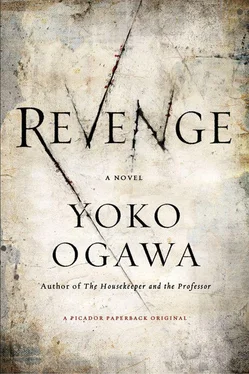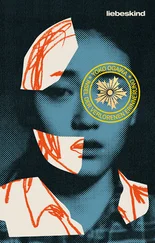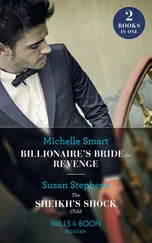The bag suited her to perfection. The lustrous finish of the leather set off the color of her skin, and its shape fit elegantly along the curve of her breast. The veins and arteries peeking out at the edges, the leather pulsing almost imperceptibly with each contraction, the strap caressing her graceful neck—I had never seen anything like it.
Her blouse and slip were discarded on the couch. The loudspeaker at the train station droned softly in the distance. I stood and admired my handiwork.
“The hole for the artery here is too high,” she said, shrugging her shoulders. “Please fix it.”
“Of course,” I said. “I’ll make the adjustment.”
The bag conformed to her every movement, protecting her heart like a faithful servant.
“It is nice and light,” she continued, “but the hooks rub my side.”
“I’ll use smaller ones and move them around to the front.”
“Yes, that might help.” She continued to test the fit—loosening the strap, rolling her shoulders, and finally striking a pose as though a microphone were in her hand.
* * *
“What’s that?” she said, pointing at a little bag sitting on the shelf above the sink.
“It’s for the hamster,” I said as I refilled her teacup.
“The hamster?”
We had removed her heart from the bag and she was buttoning up her blouse.
“I put him in it when I take him out for a walk. He seems to enjoy it.”
“Did you make his bag, too?”
“Of course.”
She stared curiously at the pouch: a simple thing compared with hers, with nothing more than a few air holes in the side.
“I never knew there were so many different kinds of bags,” she said.
I took a sip of tea and looked out at the bright sunlight.
* * *
The bag was almost finished. The leather was a soft cream color, the cutting and stitching were precise down to the millimeter. I had hung a sign on the door announcing that the shop would be closed until further notice and had spent long hours at my worktable. A regular customer had even called to ask me to repair her makeup case, but I turned her away.
The beauty of the heart oppressed me, but my hands were steady as I worked. I had managed to make a thing that no one else could have made.
* * *
The hamster died. It might have been the heat wave, or maybe I neglected him because I was so absorbed in my work. I fed him and cleaned his cage every other day—for three years and eight months—but he died anyway.
He lay still in my hand, teeth sticking out from his half-opened mouth. His body was still soft, but he already felt cold to the touch. I had no idea what to do with him, so I put him in his pouch, left my apartment, and wandered the streets of the town. I walked along the banks of the river, through the park, and around the reservoir, but I couldn’t find a place to get rid of him. From time to time I stopped to unzip the pouch and check on him, but he was definitely dead.
When I got tired of walking, I stopped in at a hamburger place. I didn’t really want a hamburger, but it was too much trouble to find a real restaurant.
I could barely eat half the food on my plate, and the coffee was almost undrinkable. When I went to throw away the trash, I slipped the hamster out of the pouch, on the tray next to my food, and slid him in the bin. I don’t think anyone noticed.
He must be covered in ketchup by now.
* * *
“What do you mean?” I asked her.
“Just what I said. I won’t be needing the bag.” She took a cigarette from her purse and lit it.
“But it will be done in a day or two…”
“I know it seems absurd to cancel the order at this point, and you have every right to be angry. But it all happened so suddenly—I can hardly believe it myself.” She let out a puff of smoke, and I watched it float toward the ceiling. “I’ve known for some time that it might be possible to put my heart back in place, but the operation always seemed too risky. Then I found a marvelous surgeon who told me he could do it using a new technique.” She went on like this a while longer, but I wasn’t listening.
“I’ll be going into the hospital next week, and I’ll be rid of this depressing thing forever.” She glanced down at her side with a look that was almost scornful.
“But it’s a wonderful bag. Here, see for yourself. I’ve moved the hole for the artery and switched to smaller hooks. I’m sure you’ll like it.” I held it out for her to see. “I just want to reinforce the stitching here and adjust the strap and it will be done.”
“I’ll pay you for it, of course. But I won’t be needing it now. I won’t have anything to put in it.”
“But see how exquisite it is. You won’t find a bag like this anywhere else. The insulation, the breathability, the quality of the materials, the workmanship…”
“I said I won’t be needing it.” As she stood to go, she brushed the bag from the table and it lay there on the floor, as still as a dead animal.
* * *
“Dr. Y from Respiratory Medicine. Dr. Y from Respiratory Medicine. Please contact the pharmacy immediately.” The announcement played again, but Dr. Y was apparently still missing.
The elevator was crowded with doctors and nurses, and patients with drip bags of yellow liquid, but I forced my way in and pressed the button for the sixth floor. I was sure I’d be able to find her room. I would pretend I was just visiting her, or I could say I wanted her to pay me for the bag. After all, I ought to get something for all my work.
First, I’ll apologize for the other day—very humbly, in order to regain her trust. And then I’ll say what I’ve come to say: “Making your bag has been a very important experience for me. I don’t think I’ll ever have the chance to make a piece like this again. Still, I’m happy you’re getting the operation and won’t need the bag. But I do have one final request: I’d like to see it put to its intended use just once. I know it’s asking a lot, but I’d be very grateful. I promise I’ll never bother you again, but nothing is more painful for a craftsman than knowing all his hard work was for nothing. Just this once, and I’d be eternally grateful.”
She’ll take off her gown, and I’ll fit it on her.
“Are you satisfied, then?” she’ll ask, eager to be rid of me.
“Thank you,” I’ll say, but when I reach for the bag, I’ll cut her heart away, too.
And then it will be mine alone.
The bag is in my left pocket. I tried to fold it flat, but there’s a little mound in my pants. I don’t think anyone will notice. The shears in my right pocket prick my thigh as I wait.
The elevator chimes, the number six lights up, and the door opens.
WELCOME TO THE MUSEUM OF TORTURE
Lots of people died today. In a city to the north, a tour bus tumbled off a cliff, killing twenty-seven and badly injuring six more. A family of three, weighed down with debt, committed suicide by turning on the gas—and when the house exploded, six more died next door. An eighty-six-year-old man was killed by a hit-and-run driver; a child drowned in an irrigation ditch; a fishing boat capsized; some mountain climbers were swept away by an avalanche. There was a flood in China, a plane crash in Nepal, and in Niger a religious cult committed mass suicide.
But it wasn’t just humans. I saw a dead hamster in the garbage can at a fast-food place this morning. I was throwing out a coffee cup when I happened to notice it. The can was so full that the lid was half open—a perfectly ordinary sight yet something caught my attention.
A hamster lay between a crumpled hamburger wrapper and a crushed paper cup. Its fur was speckled brown, and its tiny arms and legs were a beautiful shade of pale pink. The poor thing almost still looked alive. I even imagined I saw its little paws twitching. Its black eyes seemed to be looking at me.
Читать дальше












